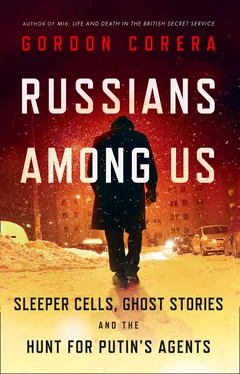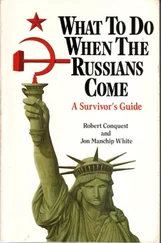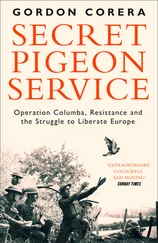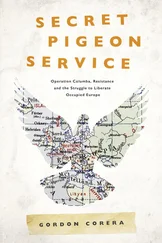
Sleeper Cells, Ghost Stories and the Hunt for Putin’s Agents

William Collins
An imprint of HarperCollins Publishers
1 London Bridge Street
London SE1 9GF
WilliamCollinsBooks.com
This eBook first published in Great Britain by William Collins in 2019
Copyright © Gordon Corera 2020
Cover image © Arcangel / Paul Gooney
Gordon Corera asserts the moral right to be identified as the author of this work
A catalogue record for this book is available from the British Library.
All rights reserved under International and Pan-American Copyright Conventions. By payment of the required fees, you have been granted the non-exclusive, non-transferable right to access and read the text of this e-book on-screen. No part of this text may be reproduced, transmitted, down-loaded, decompiled, reverse engineered, or stored in or introduced into any information storage and retrieval system, in any form or by any means, whether electronic or mechanical, now known or hereinafter invented, without the express written permission of HarperCollins
Source ISBN: 9780008318932
Ebook Edition © February 2020 ISBN: 9780008318956
Version: 2020-01-27
For Jane
CONTENTS

Cover
Title Page
Copyright
Dedication
Prologue
Introduction
1: Three Days in August
2: The Birth of an Illegal
3: Strangers in a Strange Land
4: “Karla”
5: Undercover
6: The Source
7: The Investigation
8: Breaking and Entering
9: Putin’s Spy Fever
10: Targeting
11: Enter Anna
12: The Spectre
13: Moscow Rules
14: The Controller
15: Murphy Steps Up
16: Anna Takes Manhattan
17: Closing In
18: Decision Time
19: Escape
20: The Day It Ends
21: The Squeeze
22: Vienna
23: Anger
24: Still Among Us
25: A New Conflict
26: The New Illegals
27: The New Ways
28: Revenge
Picture Section
Notes
Index
Acknowledgments
About the Author
Also by Gordon Corera
About the Publisher
IT WAS HUMID enough for haze to rise off the tarmac as fourteen people crossed paths for a few brief moments at Vienna airport on July 9, 2010. The fourteen—all accused of being spies—were changing planes but also exchanging lives.
Ten were going one way. They had been living secretly undercover in America’s suburbs, and they were now on their way to Russia.
AMONG THEM WERE a KGB-trained husband and wife from Boston who had stolen the identities of dead Canadian babies and whose own children were now sitting bewildered in Moscow. A New Jersey couple whose grumpy husband had made way for his wife to take the lead in their joint spy venture. Her success in getting close to power had set off alarm bells in Washington. Another pair had moved from Seattle to America’s capital to further their spying career. But as with the others, almost every moment of their life in America had been owned by the FBI. The last of the four couples was the oddest: a retired Russian spy and his Peruvian wife. She claimed she had not even known her husband’s real name despite decades of marriage.
Then there was a young man who had not stolen anyone’s identity but had fallen into an FBI trap while he was working his way into Washington’s circles of power—the trajectory of a new breed of spy. And last, but not least, there was the twenty-something redhead who would gather tabloid attention thanks to a party lifestyle in Manhattan and London and nude pictures splashed over the papers (pictures she had spent the plane ride complaining to the FBI about).
All ten had been betrayed by a man they had known and trusted and who days earlier had made a dramatic escape from Moscow to the West.
Arriving on a plane from Moscow and heading in the other direction were four Russian men. Two of them—bound for America—were still feeling the effects of the beatings they had been subjected to in the previous days. One had helped catch a traitor in the CIA and the agency had been desperate to get him out for years. The other had played a role in catching a traitor in the FBI but his subsequent fate was the cause of regret in the CIA. Two other Russians were heading for Britain. One was a sullen figure, angry at being forced to confess to being a spy when he said he had never been one. He was the source of guilt for Britain’s MI6. The last man, a tough former paratrooper, really had been a spy for MI6. Eight years after the Vienna swap, his former colleagues in Russian military intelligence would smear a deadly nerve agent on his front-door handle, spiraling relations between Russia and the West into an even darker place than anyone would have imagined that sunny July day.
WATCHING THE TWO groups closely was a small group of intelligence officers from the West and Russia. Many had spent their entire professional careers battling each other in the shadows. Now they were just yards apart. For years, even within their own intelligence bureaucracies they had been regarded as dinosaurs—ageing prizefighters still throwing punches at each other in the ring even though the crowd had long departed. One of the Russians in particular had devoted much of the past quarter of a century to entangling his adversaries in a web of deceit. His American adversaries thought that at long last they had the better of him. In Vienna, one side seemed to have won, the other to have lost. But that only made sense if you thought this was the end. It was not.
That evening Vice President Joe Biden appeared on The Tonight Show on American TV. The spy swap was the talk of the town. “Do we have any spies that hot?” Jay Leno asked Biden, referring, inevitably, to the redheaded woman sent back to Moscow. “Let me be clear—it wasn’t my idea to send her back,” Biden said to laughter. That was true. He was one of those who had opposed the plan to arrest the Russians and engineer a swap but had been overruled after a heated debate in the White House Situation Room. His comments fit in with a deliberate strategy from Washington to play down the significance of what had just taken place in Vienna—to treat it as an inconsequential event. And for the world watching it all seemed like some kind of bizarre retro-throwback, a hangover from the past, a last hurrah of people who could not quite let go of the Cold War. That was a mistake.
THIS IS A book about ghosts. The ghosts of spies past have haunted relations between Russia and the West even as the Cold War ended. The Cold War was fought through espionage and defined by it in the public mind. But when that conflict suddenly ended, the spying did not stop. Repeated cycles of treachery and the hunt for those responsible were an obsession for a small band of spies and spy-catchers on both sides. Neither could let go. And this obsession mattered, since the spy wars have continued to shape relations between the two sides over the decades, playing their role in the rise of Vladimir Putin and his drive for revenge.
Читать дальше














